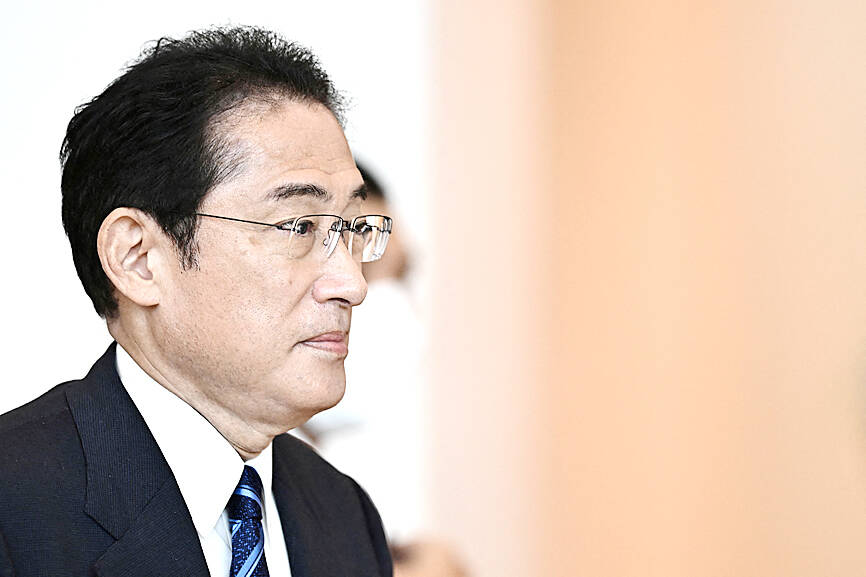Japanese Prime Minister Fumio Kishida yesterday sought to brush off a magazine report that questioned election expenses from last year by saying that while some receipts his office submitted did not include complete information, the money had been spent appropriately.
Kishida also denied domestic media reports that he was thinking of reshuffling his Cabinet in the next few weeks.
Kishida’s support has tumbled to its lowest since he took office in October last year and he has been trying to repair damage after a series of scandals forced him to replace three ministers in the space of a month.

Photo: Reuters
Although he need not face another election for more than two years, sagging approval ratings make it more difficult for Kishida to control his party and push policy pledges through parliament, including an increase in defense spending.
On top of this, Kishida is also struggling to deal with the country’s highest inflation in decades.
“I’m aware of the media reports, but I’m not thinking of that at all,” Kishida said when asked about plans to reshuffle the Cabinet. “I must focus on parliament now.”
An online report by Bunshun magazine emerged this week about incomplete receipts relating to his campaign for the general election last year.
The prime minister said he would instruct his office to make sure such problems do not recur.
He said that he did not know the total amount involved, but believed that the items purchased included things such as food from a convenience store and stationery.
The money was spent appropriately, in accordance with a report to which the receipts were attached, he said.
Kishida, who came to office buoyed by a clean image, was battered by a scandal over his party’s links to the Unification Church, which has a long list of court rulings against it over its fundraising methods.
The religious group came under renewed scrutiny after former Japanese prime minister Shinzo Abe was fatally shot in July by a man who cited a grudge over the former leader’s ties to the church.
The man blamed the group, whose members are known as “Moonies,” for bankrupting his family by taking excessive donations from his mother.

A colossal explosion in the sky, unleashing energy hundreds of times greater than the Hiroshima bomb. A blinding flash nearly as bright as the sun. Shockwaves powerful enough to flatten everything for miles. It might sound apocalyptic, but a newly detected asteroid nearly the size of a football field now has a greater than 1 percent chance of colliding with Earth in about eight years. Such an impact has the potential for city-level devastation, depending on where it strikes. Scientists are not panicking yet, but they are watching closely. “At this point, it’s: ‘Let’s pay a lot of attention, let’s

UNDAUNTED: Panama would not renew an agreement to participate in Beijing’s Belt and Road project, its president said, proposing technical-level talks with the US US Secretary of State Marco Rubio on Sunday threatened action against Panama without immediate changes to reduce Chinese influence on the canal, but the country’s leader insisted he was not afraid of a US invasion and offered talks. On his first trip overseas as the top US diplomat, Rubio took a guided tour of the canal, accompanied by its Panamanian administrator as a South Korean-affiliated oil tanker and Marshall Islands-flagged cargo ship passed through the vital link between the Atlantic and Pacific oceans. However, Rubio was said to have had a firmer message in private, telling Panama that US President Donald Trump

CHEER ON: Students were greeted by citizens who honked their car horns or offered them food and drinks, while taxi drivers said they would give marchers a lift home Hundreds of students protesting graft they blame for 15 deaths in a building collapse on Friday marched through Serbia to the northern city of Novi Sad, where they plan to block three Danube River bridges this weekend. They received a hero’s welcome from fellow students and thousands of local residents in Novi Said after arriving on foot in their two-day, 80km journey from Belgrade. A small red carpet was placed on one of the bridges across the Danube that the students crossed as they entered the city. The bridge blockade planned for yesterday is to mark three months since a huge concrete construction

DIVERSIFY: While Japan already has plentiful access to LNG, a pipeline from Alaska would help it move away from riskier sources such as Russia and the Middle East Japan is considering offering support for a US$44 billion gas pipeline in Alaska as it seeks to court US President Donald Trump and forestall potential trade friction, three officials familiar with the matter said. Officials in Tokyo said Trump might raise the project, which he has said is key for US prosperity and security, when he meets Japanese Prime Minister Shigeru Ishiba for the first time in Washington as soon as next week, the sources said. Japan has doubts about the viability of the proposed 1,287km pipeline — intended to link fields in Alaska’s north to a port in the south, where